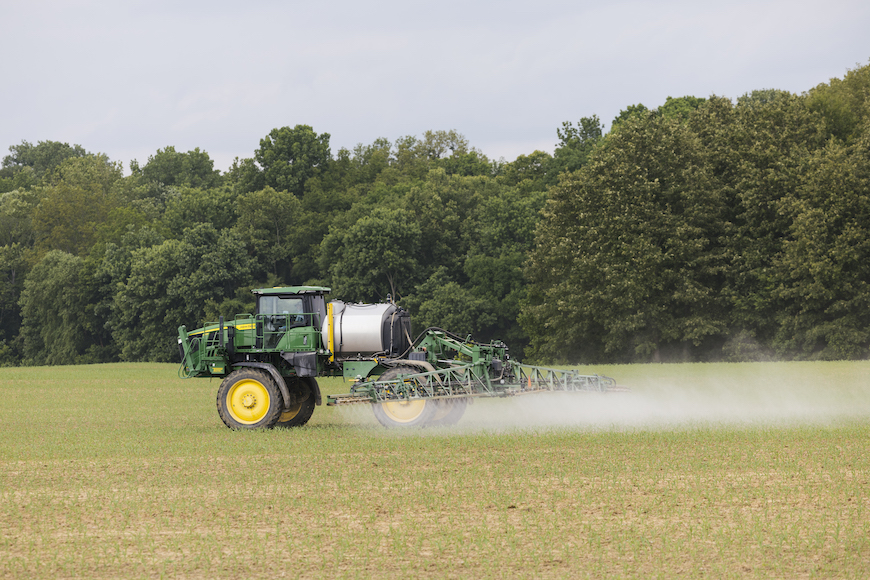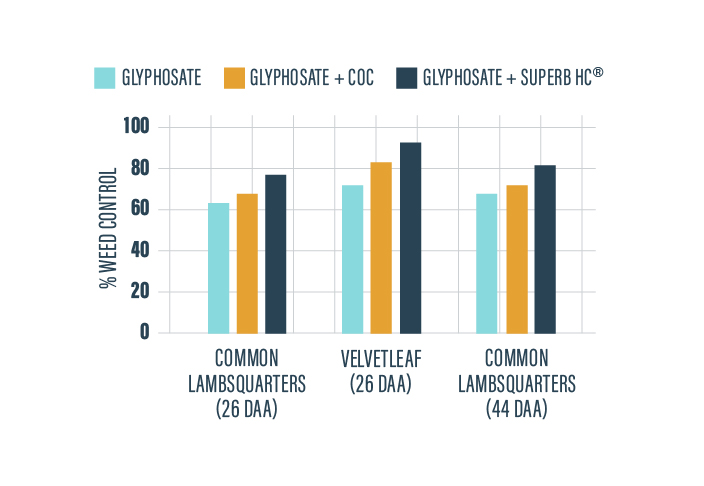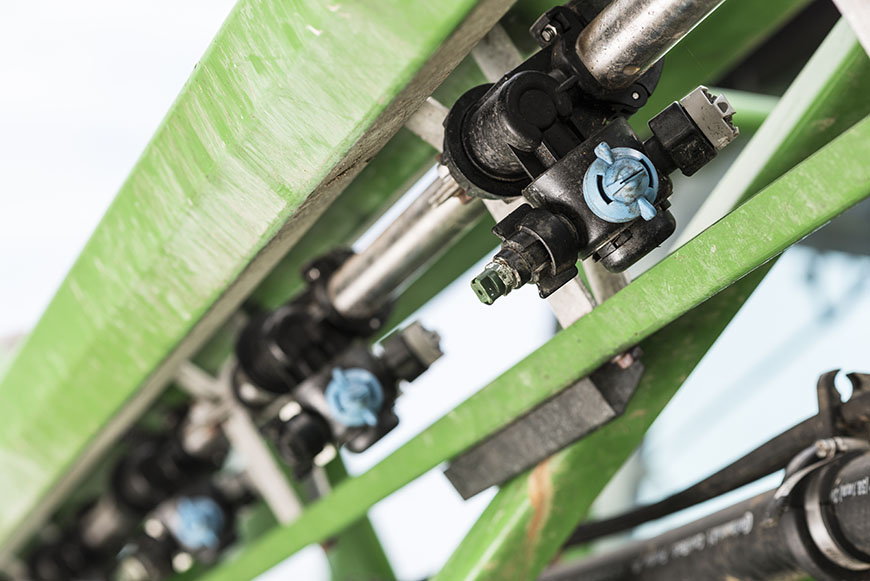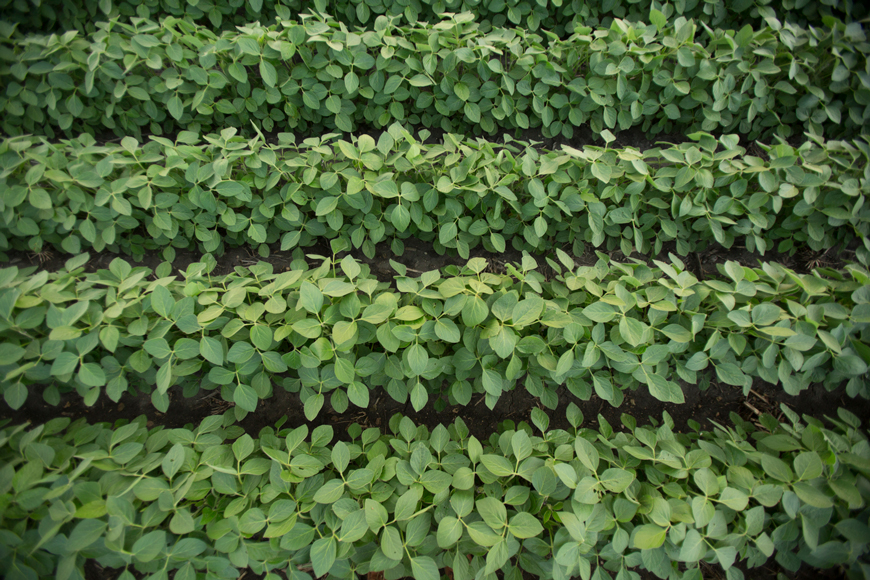Plan Ahead with Proven Adjuvants in 2026

Weed competition can be one of the costliest threats to your crop’s performance. Based on what you’ve observed in your fields this season, you may be considering a different or refined weed control strategy for next year. Adding premium adjuvants to your herbicide tank mix is a proven way to help enhance the performance of your spray application and improve weed control. Here are four adjuvant classes to discuss with your agronomic advisor as you plan for 2026.
Water Conditioners
Water conditioners tie up cations including calcium and magnesium in water so that negatively charged herbicide particles don’t bind to them and reduce herbicide effectiveness. Ammonium sulfate (AMS) water conditioners are commonly used with glyphosate and glufosinate applications to improve herbicide performance.
You’ll want to ensure that water conditioner rates are high enough to condition the water adequately, so I recommend a high-quality, AMS-based product for glyphosate and glufosinate applications. Class Act® NG® adjuvant combines AMS with a nonionic surfactant and antifoaming agent in a liquid premix. One benefit of Class Act NG adjuvant is the pre-dissolved liquid AMS alleviates sedimentation and nozzle plugging in the sprayer. Plus, it’s formulated with CornSorb® technology to help improve uptake of herbicide active ingredients into the plant, as shown by a 2024 WinField® United study.
 1 2024 WinField United Innovation Center Controlled Environments study, comparing herbicide leaf uptake using Class Act NG adjuvant v. dry AMS.
1 2024 WinField United Innovation Center Controlled Environments study, comparing herbicide leaf uptake using Class Act NG adjuvant v. dry AMS.
2 WinField United Innovation Center Controlled Environments study, comparing herbicide leaf uptake using Liberty herbicide + Class Act NG adjuvant v. Liberty without AMS.
Drift Reduction and Deposition Aids
Drift reduction and deposition aids (DRAs) are formulated to optimize spray droplet size to keep more active ingredient on the intended target. Increased spray coverage helps improve weed control and results in fewer weed escapes, which is a key factor in limiting the development of herbicide-resistant weeds.
InterLock® adjuvant is a proven product formulated to reduce fine particles in spray patterns, reducing drift and promoting canopy penetration to help spray reach its target. It can help improve droplet coverage to ensure the spray contacts troublesome weeds. WinField United research shows InterLock adjuvant reduced driftable fines from the baseline treatment by an average of 33% across four herbicide tank mixtures.2
Crop Oils
High surfactant crop oil concentrates and high surfactant methylated seed oils help emulsify the oil and lower the surface tension of the spray solution, making each droplet stick and spread more evenly. These products can make oil-loving herbicides more soluble in the spray solution and improve leaf penetration to increase herbicide uptake.
For oil-loving herbicides, StrikeLock® adjuvant is a great and extensively tested addition to the tank mix, proven to help improve canopy and cuticle penetration for greater weed control. StrikeLock adjuvant is a high surfactant methylated seed oil with a built-in drift and deposition aid that infiltrates leaf surfaces, leading to 34% more coverage to support Enlist® One herbicide uptake.3
Superb® HC adjuvant is a high surfactant crop oil concentrate for use with glyphosate herbicides. This paraffinic petroleum oil is formulated especially for post-emergence herbicides that require a crop oil concentrate. Superb HC adjuvant can typically be used at half the use rate of standard crop oil concentrates, while increasing herbicide penetration to a greater degree.

Surfactants
Surfactants are used in herbicide formulations to increase surface contact, reduce runoff and increase leaf penetration. Typical surfactants include spreaders, stickers, emulsifiers and wetting agents.
Nonionic surfactants are water-soluble chemical and lipid compounds that reduce the surface tension of water to improve spreading characteristics. Due to their neutral charges, they are compatible with most herbicide products.
Nonionic surfactants are critical for achieving effective weed control, especially when glyphosate rates are cut. Under those circumstances, the surfactant loads in glyphosate products are reduced. In addition, as the concentration of glyphosate product increases, the surfactant load decreases; therefore, using a 6-pound-per-gallon glyphosate product at a 90% application rate reduces much of the surfactant on the acre.
Adding a surfactant such as Preference® adjuvant to the tank mix can help improve the spreading characteristics of the spray solution. Preference adjuvant contains a nonionic surfactant plus an antifoaming agent to help reduce surface tension on the leaf and slow the evaporation rate to improve herbicide uptake.
Keeping fields clean and weed-free is critical for optimal crop performance. With more and more generic adjuvants on the market, you know you can trust proven products, backed by performance data to increase the efficacy of your herbicide tank mixes. Work with your trusted advisor to select the best options for your budget and weed control needs.
3 2024 WinField United Innovation Center Controlled Environments study comparing herbicide leaf uptake comparing using StrikeLock adjuvant + Enlist One v. Enlist One alone
© 2025 WinField United. Important: Before use always read and follow label instructions. Crop performance is dependent on several factors many of which are beyond the control of WinField United, including without limitation, soil type, pest pressures, agronomic practices and weather conditions. Growers are encouraged to consider data from multiple locations, over multiple years and to be mindful of how such agronomic conditions could impact results. Class Act, NG, CornSorb, InterLock, Preference, StrikeLock, Superb and WinField are trademarks of WinField United. All other trademarks are the property of their respective owners.




